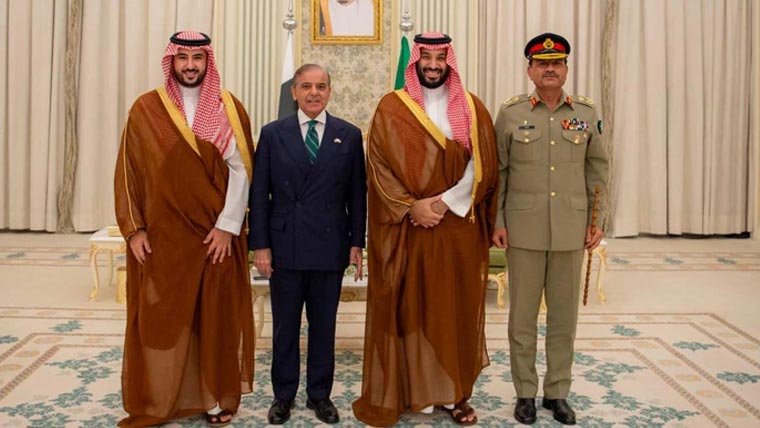Masood Khalid Khan
The new Strategic Mutual Defence Agreement between Pakistan and Saudi Arabia represents more than a bilateral milestone; it marks a redefinition of regional security in an era of shifting alliances. Coming so soon after Israel’s attack on Doha, the accord underscores the urgency with which Muslim states now see the need for collective security guarantees. It is not merely a statement of friendship but a structured commitment that binds military and political destinies in the face of emerging threats.
This partnership is rooted in history. For decades, Pakistani troops have been stationed on Saudi soil, while Riyadh has extended vital economic lifelines to Islamabad in times of crisis. The pact does not create a new relationship; rather, it formalises and elevates an enduring partnership into a clear framework for shared defence. What has long been informal understanding has now been written into an agreement, signalling a deeper strategic convergence.
Follow Republic Policy on YouTube
The essence of the agreement is direct and profound: aggression against one will be treated as aggression against both. By committing to collective defence, the two countries have created a deterrent mechanism far more credible than verbal assurances or symbolic gestures. Pakistan’s battle-tested military and Saudi Arabia’s economic and political weight combine to send a signal to adversaries that neither state stands alone. This is not a rhetorical pact but a genuine umbrella of security with immediate implications for stability across the Gulf and South Asia.
The timing of the agreement carries strong optics. The strike on Qatari territory served as a wake-up call to Gulf states, exposing the limitations of relying solely on Washington as a guarantor of sovereignty. Riyadh’s accord with Islamabad therefore offers reassurance based on mutual interest rather than conditional foreign guarantees. For Pakistan, it elevates its standing as a pan-Islamic security partner and positions it firmly within the evolving architecture of Gulf defence at a time when multipolar alignments are filling the spaces left by an overstretched United States.
Follow Republic Policy on Facebook
The pact also strengthens the foundation for expanded economic cooperation. Saudi Arabia is already one of Pakistan’s largest investors and donors, but defence agreements of this magnitude create political trust that enables deeper financial commitments. Energy projects, industrial investments, and infrastructure partnerships are all likely to grow under the security umbrella of the accord. For Islamabad, such inflows are essential for stabilising finances, managing external debt, and spurring growth. Defence cooperation and economic partnership have always gone hand in hand, and this agreement must be viewed as a catalyst for both.
Follow Republic Policy on TikTok
Domestically, the pact carries political weight in both countries. For Pakistan, it demonstrates that the state is not isolated but central to the security calculus of the Muslim world, countering narratives of diplomatic marginalisation. For Saudi Arabia, the agreement signals to its people and its neighbours that the kingdom is willing to diversify alliances and secure its interests proactively rather than relying solely on distant powers. This is especially significant given the turbulence caused by Israel’s regional actions and the continued presence of Iran as a key player in Gulf affairs.
Follow Republic Policy on Instagram
Inevitably, India will read the pact with interest. While Riyadh maintains strong economic ties with New Delhi, the commitment to mutual defence with Pakistan introduces a new variable into the region’s security matrix. Though the agreement is not designed as an anti-India measure, New Delhi will be forced to assess whether Saudi Arabia would stand with Islamabad in the event of renewed hostilities on Pakistan’s eastern front. Yet, the core message of the pact is broader: its primary focus is Gulf security and the establishment of Pakistan and Saudi Arabia as co-anchors of a collective defence framework.
Follow Republic Policy on WhatsApp
The real significance of the pact lies in its projection of stability and confidence. It shows that two longstanding allies are prepared to take responsibility for their own security rather than depending on external powers whose interests may shift. The agreement is not only about military guarantees but about creating a stable environment for political trust, economic investment, and collective deterrence. Other Gulf states, particularly members of the GCC, may see this accord as a model to follow, deepening regional cooperation and reducing dependence on extra-regional actors.
The Pakistan-Saudi accord is the most serious step in decades towards formalising a regional security framework rooted in Islamic solidarity and pragmatic necessity. In a volatile environment where traditional guardians of order appear unwilling or unable to act, Islamabad and Riyadh have chosen to anchor their futures together. The strategic, political, and economic implications of this decision will be profound and enduring, shaping Gulf and South Asian security for years to come.















